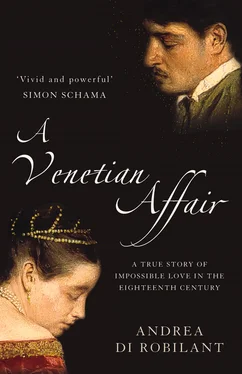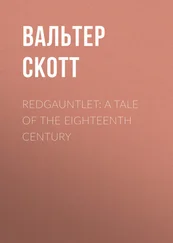Andrea fretted constantly about how dangerous it was to write to each other. If their correspondence ever fell into the wrong hands, there would be an explosion “that would reduce everything to a pile of rubble.” Still he deluged Giustiniana with letters and notes, often filling them with practical advice and detailed descriptions of his frantic chases around town. “We are completely mad…. If only you knew how afraid I am that your mother might find out we are seeing each other again.”
It was a glorious adventure. There were times when they managed to get close enough to steal a quick embrace in an alcove at the Ridotto or in the dark streets near the theaters at San Moisè, and the thrill was always powerful. “Last night, I swear,” Andrea wrote to his beloved the morning after one of these rare encounters, “you were so heated up, oh so heated up, such a beautiful girl, and I was on fire.” But in the beginning they tended to hold back. They made their moves with deliberation. They kept each other at a safe distance: lovemaking was mostly limited to what their eyes could see and what their eyes could say.
It is easy to imagine how, in a city where both men and women wore masks during a good portion of the year, the language of the eyes would become all-important. And what was true in general was especially true for Andrea and Giustiniana on account of the rigid restrictions that had been imposed on them. Andrea was being very literal when he asked anxiously, “Today my lips will not be able to tell you how much I love you…. But there will be other ways…. Will you understand what my eyes will be saying to you?” What their eyes said was not always sweet and not always clear. With such strong emotions at play, it could take days to clear up a misunderstanding precipitated by a wrong look or an averted gaze. One night, Andrea returned to Ca’ Memmo after a particularly frustrating attempt to make contact with Giustiniana. It had taken him all evening and a great deal of effort and ingenuity to find her at one of the theaters. Yet in the end she had displayed none of the usual complicity that made even the briefest encounter a moment of joy. In fact, she had been so annoying as to make him wish he had not seen her at all:
Yesterday I tried desperately to see you. Before lunch the gondoliers could not serve me. After lunch I went looking for you in Campo Santo Stefano. Nothing. So I walked toward Piazza San Marco, and when I arrived at the bridge of San Moisè I ran into Lucrezia Pisani! * I gave her my hand on the bridge, and then I saw you. I left her immediately and went looking for you everywhere. Finally I found you in the piazza. I sent Alvisetto ahead to find out whether you were on your way to the opera or to the new play at the Teatro Sant’Angelo, so that I could rush over to get a box in time. Then I forged ahead and waited for you, filled with desire. Finally you arrived and I went up to my box so that I could contemplate you—not only for the sheer pleasure I take in admiring you but also in the hope of receiving a sign of acknowledgment as a form of consolation. But you did nothing of the sort. Instead you laughed continuously, made loud noises until the end of the show, for which I was both sorry and angry—as you can well imagine .
A few days later Andrea tracked her down after yet another chase along crowded streets and across canals. This time the reward was well worth the pursuit:
I caught sight of your mother and hoped you would be with her. I looked for you left and right. Nothing. Your mother left, I followed. She went to San Moisè, I went to San Moisè. In fact, I got so close to her that we would have bumped into each other at the entrance of a bottega if I had not been so quick…. [Later] I waited in vain for Alvisetto, whom I had instructed to follow your mother…. Then I got your letter telling me that you would be going to San Benetto, so I rushed over only to realize with regret that you had already arrived and that the opera had begun…. Oh Lord, what will Giustiniana say…. Let’s see how she will treat me…. Goodness, there she is, that naughty girl [who wouldn’t look at me] the other evening…. Will she look at me this time or won’t she…. Come, look this way my girl! … And little by little I began to feel better. And then much better when I moved into that other box because I could see you and you could see me so well and with no great danger that your mother might notice every little gesture between us .
As an overall strategy, Andrea felt it was important to convince Mrs. Anna that the love between him and Giustiniana had indeed subsided and that she could finally let her guard down. It would be easier for them to find ways to see each other. So whenever Mrs. Anna took her daughter to a place where there was a good chance they might see him, Giustiniana was to feign complete disinterest:
Sometimes, in taking risks, one must be willing to be la dupe de soi-même. So arrange things in such a way that she will feel she is forcing you to go to all the places where she knows you might run into me, such as San Benetto or the Ridotto…. And when the weather is nice, show little interest, even some resistance, to taking a walk to the square…. Believe me, our good fortune depends on the success of our deception…. To avoid coming to San Benetto, all you have to do is tell her you don’t feel well. As for the Ridotto, you can say, “In truth, Mother, it bores me too much. Besides, we have no one to speak to and I don’t feel like playing [cards]. And we don’t make a good impression anyway, walking around with no other company. So let me go to bed.” And if she refuses and takes you out with her, you will see me and she will say, “Giustiniana doesn’t fret about Memmo anymore.”
In public Andrea and Giustiniana behaved like two strangers. Yet if their relationship was ever to develop, if they were to make arrangements in order to meet somewhere safely and actually spend time together, they were going to need more reliable allies than Alvisetto—friends willing to take the risk of giving them cover and providing them with rooms where they could see each other in private. Andrea worked hard to identify those who might be most useful to them. He gave precise instructions to Giustiniana as to how she should behave to bring this or that friend over to their side. But his instructions were not always clear. When Giustiniana innocently told a potential ally that she no longer loved Andrea when in fact Andrea had asked her to say the opposite, he gave her a sharp rebuke: “As soon as I do a good piece of work, you ruin it for me. The truth is … and I am very sorry to have to say this, you have not been up to my expectations.”
Andrea could be equally hard when he thought Giustiniana was not keeping enough distance from possible enemies. He was wary of the young Venetian nobles who hung around the Ridotto and who delighted in gossip and intrigue. It was important not to give them a reason to unleash their malicious tongues. As a rule, he explained to Giustiniana, “it is good for us to have the greatest number of friends and the least number of enemies.” But there was no need to be closer to that crowd than was strictly necessary. And he criticized her when he saw her displaying too much friendliness to acquaintances he did not consider trustworthy.
He was especially suspicious of the Morosinis, who had always sided with Mrs. Anna in her battle against the two lovers—merely to spite him, Andrea thought. The Wynnes were often lunch guests at Ca’ Morosini on Campo Santo Stefano, and Giustiniana’s persistent socializing with the enemy infuriated Andrea. She had to choose, he finally said to her, between him and “those Morosini asses”:
I know it is a lot to ask, but I can ask no less…. I must put you through this test, and I shall measure your love for me by it…. Giustiniana, I shall be very disappointed if you disregard my wish. I have never met anyone so impertinent and so false toward both of us…. They like you merely because you amuse them…. By God, you will not be worthy of me if you lower yourself to the point of flattering these…. stupid enemies of mine…. these rigid custodians of Giustiniana who spy for your mother…. They are evil people with no human qualities and no respect for friend-ship…. Forgive me for speaking this way to you, but I am so angry that I cannot stand it anymore .
Читать дальше












